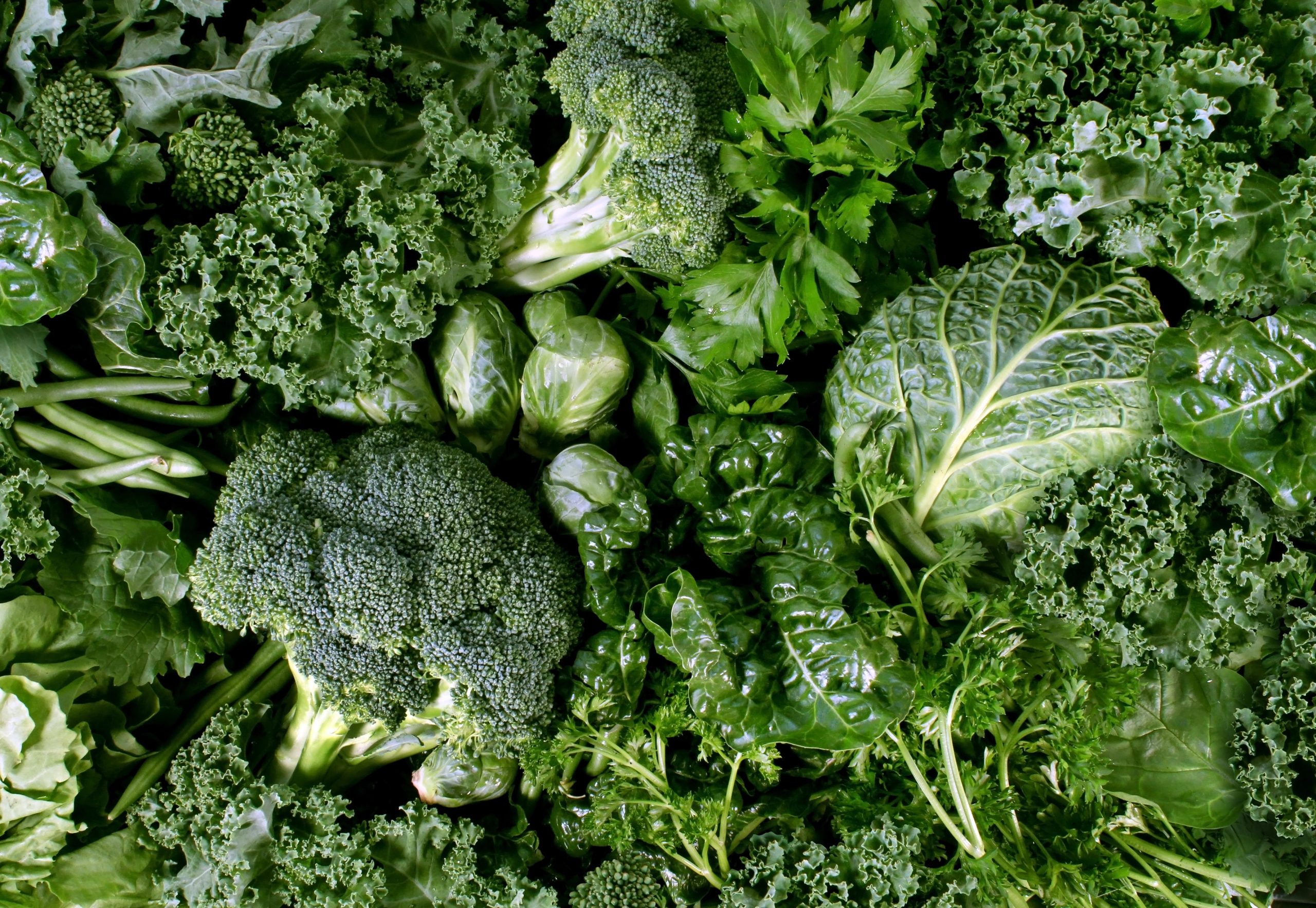12 Benefits of Leafy Greens In Your Diet
Green Veggies Support Optimal Brain Function
Studies have found that people who eat leafy greens each day had slower rates of cognitive decline compared to those that did not. Organic vegetables contain high levels of folate, which faciliates the production of neurotransmitters in the brain. Folate is found in leafy greens like spinach, broccoli, and lettuce.
Leafy greens reduce belly bloating
Leafy greens contain high amounts of potassium, which is a mineral and an electrolyte. Potassium is essential to keep an optimal fluid balance in your body. A diet high in sodium (often due to an overreliance on processed foods) can trigger or worsen bloating and must be kept in check by adequate potassium intake – roughly 4,700 mg/day according to the USDA’s Dietary Guidelines.
Green Leafy Veggies make your skin glow
Beta-carotene can support a youthful glow in your skin and even works from the inside out as a natural sunscreen, protecting your skin from harmful UV rays. Kale is one of the best sources of beta-carotene, and research shows that cooking, juicing, or dehydrating kale helps your body better absorb beta-carotene.
Leafy Greens Relieve Stress
A big green smoothie is a great way to start your and relieve stress, Dark leafy greens are an excellent source of folate, which helps your body produce mood-regulating happy hormones such as dopamine and serotonin. Additionally, the magnesium found in leafy greens can help support cardiovascular health.
Leafy Greens Support Healthy Aging
Eating dark leafy greens promotes skin health by protecting against the sun’s harmful UV rays. The beta-carotene found in leafy vegetables converts to vitamin A in the body, which supports the reduction of fine lines and wrinkles, smooths the complexion, reduces dullness, and stimulates cell turnover for clear skin.
Leafy Greens Support Bone Health
You can get plenty of calcium for optimal bone health from eating leafy greens. Green veggies such as broccoli and kale contain high amounts of all-important vitamin K, which promotes the formation of proteins that build bones and clots your blood.
Leafy Greens Improve the Inflammatory Process
Supporting a healthy inflammatory response is essential to reduce your risk of developing an autoimmune disease. Leafy greens such as spinach, kale, and collards are high in vitamin D, which promotes the formation of T-cells responsible for accurately differentiating between outside invaders and your body’s own cells.
Green Veggies Help Regulate Blood Glucose Levels
Eating a serving of leafy greens with every meal facilitates healthy blood glucose levels. Even just including one extra serving of green leafy vegetables daily can make a big difference in blood glucose levels. Broccoli and broccoli sprouts are great green veggies to help lower blood glucose levels. Spinach and kale, which are also high in vitamin C, are also leafy greens to incorporate into your diet to help regulate blood glucose.
Leafy Greens Support Optimal Gut Health
A recently discovered gene known as T-bet that gets switched on by cruciferous veggies such as broccoli or brussels sprouts instructs precursor cells in your intestinal lining to produce innate lymphoid cells (ILCs). The ILCs found in leafy greens protect your body against gut infections and facilitate a healthy inflammatory response. They also support a healthy immune system response and help seal the tight injunctions in your gut. ILCs also support an optimal balance between good and bad bacteria in your gut microbiome.
Green Leafy Vegetables Tame the Toxins
Dark leafy greens are expert detoxifiers, thanks to chlorophyll–the pigment that makes them green! Chlorophyll-rich foods such as spirulina, chlorella, parsley, and alfalfa bind to heavy metals and toxins in your blood and carry them out of your body. Chlorophyll also supports your liver to facilitate the creation of your body’s natural detoxing nutrient, glutathione.
Green Vegetables Boost Digestive Enzymes
Digestive enzymes are critical for breaking down and absorbing the nutrients from our food. As you get older, your body may stop making certain enzymes such as lactase that help break down lactose, a sugar found in cow’s dairy. if you lack certain digestive enzymes, you are likely to experience bloating, constipation, reflux, and nutrient deficiencies.
Leaky gut is one of the biggest culprits of enzyme deficiency, as well as inflammation from food sensitivities, chronic stress, genetics, and aging. Dark leafy greens are one of the best foods you can eat to support your body’s natural ability to produce digestive enzymes.
Leafy Greens Support Your Immune System
One of the most promising benefits of leafy greens is how they support your immune system. Dark leafy greens such as moringa leaf facilitate a healthy response to oxidative stress caused by free radicals which, if left untreated, can lead to autoimmunity and heart disease. Studies specifically mention broccoli, arugula, and kale as vegetables that facilitate a healthy immune system response.
Adapted from https://www.amymyersmd.com/article/benefits-leafy-greens.


